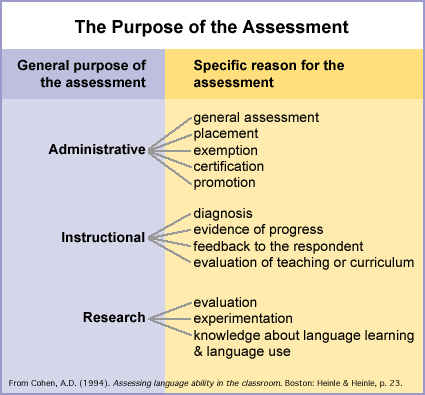Why Assess?
Purposes of Assessment
Assessment of student learning is important to a variety of stakeholders locally, regionally, and nationally, depending on the type and purpose of the assessment. Cohen (1994) identified a number of specific reasons for assessing student learning and organized them by administrative, instructional, and research functions, as shown in the following chart.

Shrum and Glisan (2010) describe a paradigm shift in assessment practices in the world language classroom. In the old paradigm, the purpose of assessment was simply to evaluate language learners and assign grades. The new paradigm identifies multiple purposes of assessment:
- To assess learner progress in proficiency
- To assess attainment of the National Standards
- To guide and improve student performance
- To evaluate and inform instruction and program design
- To make a seamless connection between instruction and assessment (p. 396)
Brown and Abeywickrama (2010) see assessment as integral to the cycle of teaching and learning, and continuous throughout the cycle. They suggest ways that assessments are useful:
- Periodic assessments, both formal and informal, can increase motivation by serving as milestones of student progress.
- Appropriate assessments aid in the reinforcement and retention of information.
- Assessments can confirm areas of strength and pinpoint areas needing further work.
- Assessments can provide a sense of periodic closure to modules within a curriculum.
- Assessments can promote student autonomy by encouraging students' self-evaluation of their progress.
- Assessments can spur learners to set goals for themselves.
- Assessments can aid in evaluating teaching effectiveness. (p. 22)
